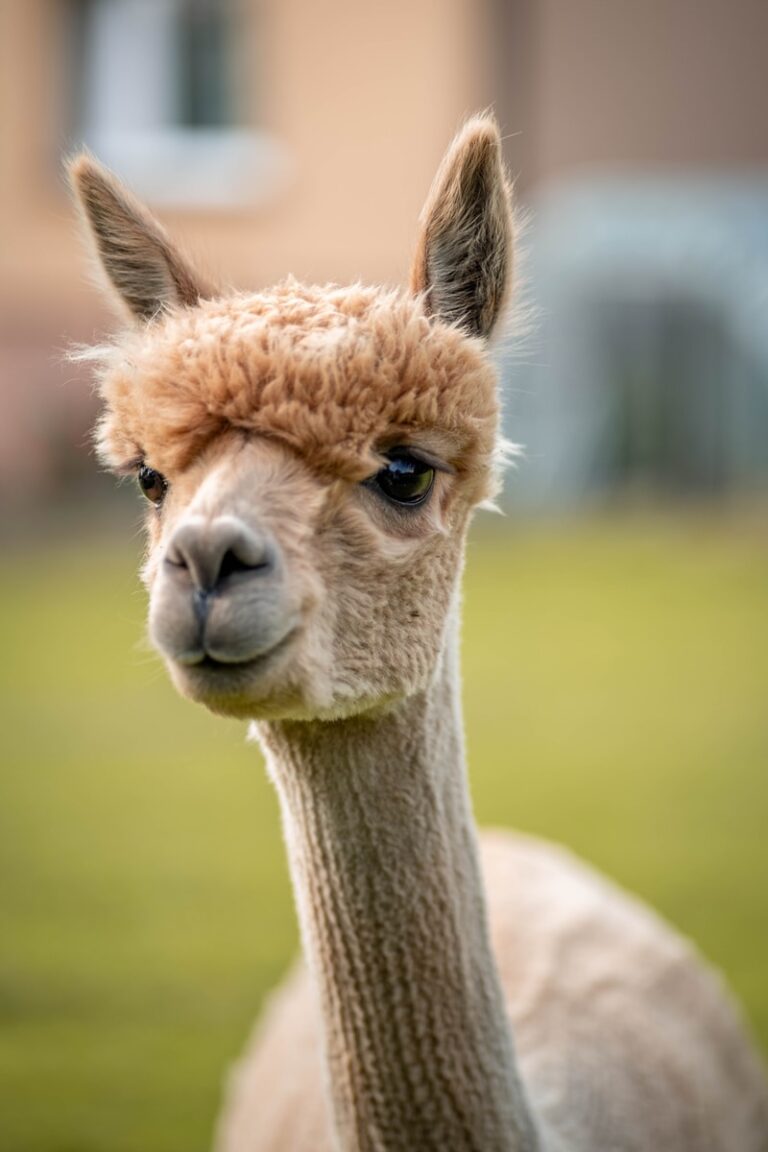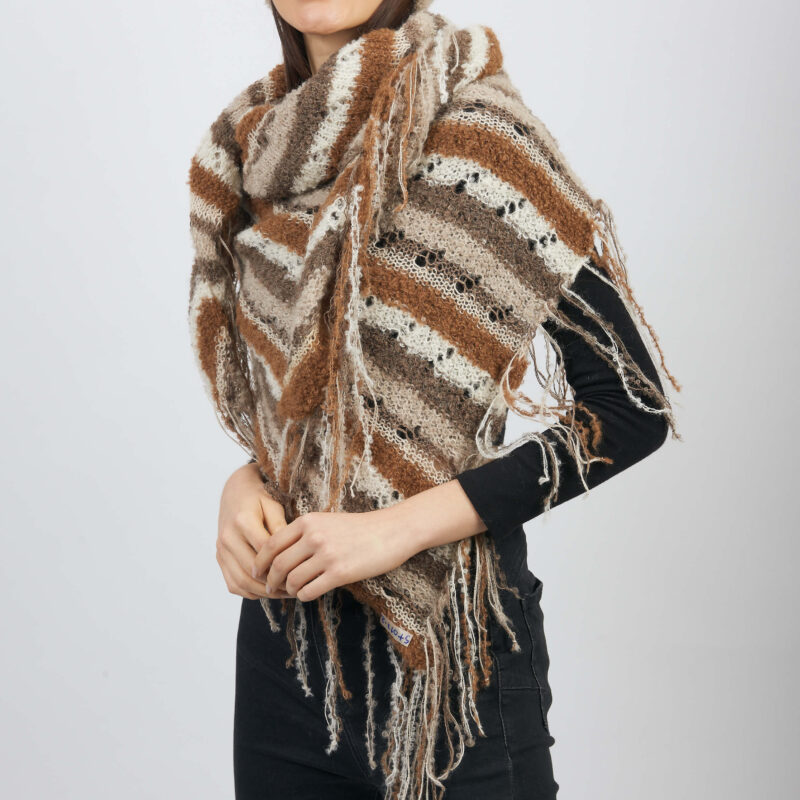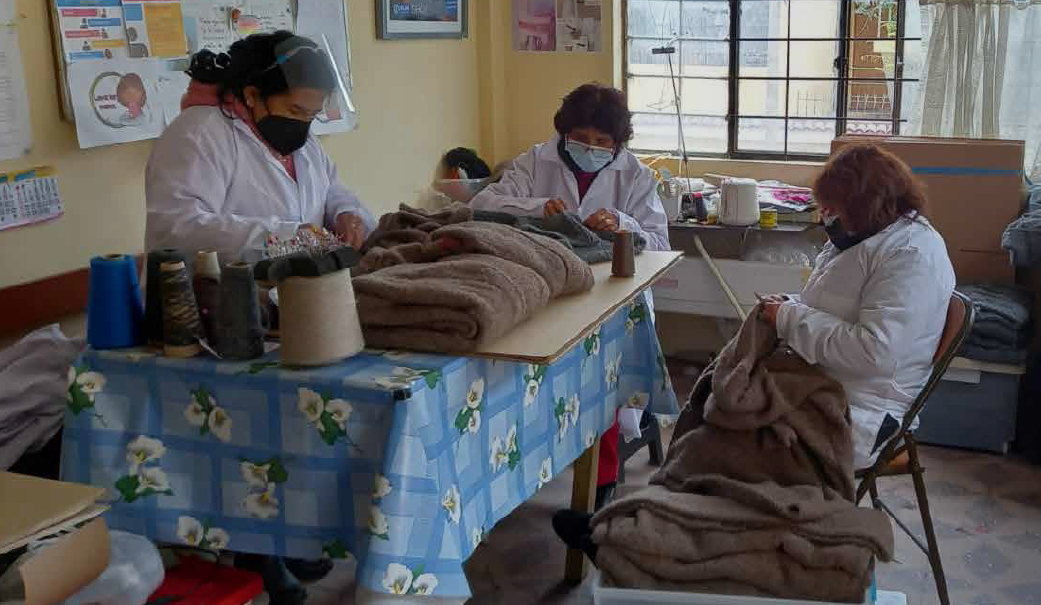Who we are

Inspired by them
Since 1995


Present Days
Our Mission
“Elaborate textile products in a semi-artisanal way, using mainly natural fibers, with the purpose of giving work to women with limited resources”.

Producing Responsibly

There are heroes and heroines of the tenacious fight against poverty, personalities who make the goal of their lives, to ensure that hundreds of thousands of people, in conditions of poverty, see their deficiencies alleviated and do not lose their faith in humanity. In contemporary Peru, one of these personalities is Elia Legua, a talented woman, economist, leader, and entrepreneur. Raised in the school of work since she was a child, she helped her parents and learned useful lessons from them, but above all honesty and solidarity with others, because, to overcome poverty, it was necessary to work tirelessly and help each other among poor people. . Elia, with her own language, tells us this beautiful story.
“While still a teenager, at the age of 13, I joined a group of young Catholics from the church in my neighborhood with whom, organized, we did activities in San Juan de Miraflores, in the Orphanage and the Nursing Home, to bring them toys, clothes, and food. When I left the catechesis we continued doing activities sponsoring the elderly. Later, a rule came out that did not allow you to visit them if you weren’t familiar. “
Later, from this approach to people in need, she began her studies in economics at the university. By then, her volunteer activities began to promote entrepreneurship. She organized production activities in family gardens. In 1982, she began her political activity, she was elected councilor and deputy mayor of the municipality of San Juan de Miraflores. She was in charge of the creation of the Committees of the glass of milk and soup kitchens, and, also, was supervisor of income.
On that occasion, she created 79 soup kitchens that were inaugurated by the mayor of Lima, Dr. Alfonso Barrantes Lingán. For the success of these activities, Elia tells that she managed to summon 150 university volunteers with whom they registered, house by house, and a good census of the state of minors was made, up to 12 years old.
With a small fee that the mothers gave for fuel, popular pots were organized in each block.
San Juan de Miraflores was the first district to have soup kitchens in Peru, which were installed in communal halls. In this way, almost 80% of the settlements had dining rooms, with which the hunger of these marginal populations was effectively mitigated.
Elia, she tells that, for the control and good supply, she implemented a control system from top to bottom, so that there is no way that the supply would not reach the ladies. Each block had a representative who had to publish in a visible place, what and how much each family had so that everyone had the information in due time. This was done for 72 settlements, where approximately 150,000 people lived. The impact was extraordinary and exemplary as new and successful management in the country.
Elia reminds us that: “The ladies came to tell me about their problems, well, they had problems of family violence and infidelities with their husbands; problems with their children because they lack money did not allow them to feed them properly, they could not make them study. I had studied economics as a profession and wanted to help them ”. This is how popular leaders like Elia, carry weight or a giant goal and march determined to overcome it.
In 1987, she finished her job as a counselor, but she did not want to abandon the ladies, as she felt they needed her. She then formed an NGO called: IDEC (Institute of Development and Culture) to help sell the artisan products produced in the workshops: “We made burlap, embroidered cards, the ones you see now in everyone sides, they are an invention of mine, the fabrics were later, the result of many pieces of training that we did “, says Elia Legua.
To get a market and sell at fairs and embassies, they made contacts with sponsors and buyers from Canada and Germany. It was necessary to raise funds so as not to depend exclusively on sales, there, intelligently, Elia realized that people who worked for a fixed salary, did not try hard enough.
So, she decided to change from NGO to company: “where we all work, the administrative team and the artisans so that we all win according to our effort,” says Elia. This was from 1993.
In this process, she found that there were women who were especially segregated, such as older women and those with young children, who were unable to work outside the home. She set herself the task of working with them, for that it was necessary to train them. In this way, she managed to have up to 120 women working.
For them, she sought help from Fair Trade buyers, such as Sancho Panza, Plan Shop, El Puente, who helped them attend fairs in Germany.
In these times of pandemic, orders dropped a lot; Then, she again formed a support group, with the buying companies, her husband, children, and the friends of her children, to distribute food that was what the mothers of families needed the most; they distributed up to 16 weekly baskets. A challenge. Still, they continue to do it, especially with older women and according to the situation of each family.
Since July 2020, the orders have happily returned and they had the opportunity to give the ladies work again. The difficult thing was the quality control and to control the specifications of the clients, which cannot be done from a distance, so she herself had to go out to control house by house.
According to Elia: the training plan has been a fundamental pillar for the development of the company and has made it possible to achieve the quality required by the client. This, in turn, impact the self-esteem of the artisans, who strived for high-quality production. In the lifetime of the company, they have trained more than 3000 women in different subjects, especially in production and quality control. This is an amazing achievement that should be replicated elsewhere in Peru.
Elia attributes this success to the fact that they are a communicative team. She tells us that administrative workers and production companies are always informed of the company’s situation and their suggestions are taken into account for decision-making. And this seems to be the real secret: transparency and horizontality.
Very satisfied with her activity, Elia tells us: “My job is design, I happily discovered that she had that ability. Every year we renew the collection, both in clothes and toys. From 1995 to date, we have been exporting: we want to expand the market to ensure the work of our network of artisans ”.
As an anecdote, she tells us that a friend from Germany visited them and she proudly showed her sweater, as her model so that they could make her a similar product; Elia, she looked for her label and showed him that her sweater was a product of hers, a product of Peruvian hands, by Ecco Exe.

Our Community

We understand ourselves also as an enterprise with social responsibility. Therefore we adapt our production processes in such a way that disadvantaged women can work both in our training/production location and at home. These flexible working conditions allow them to be at home attending to their obligations as (mostly) single mothers. So far we have trained more than 2,000 women. The learning of this activity enables these disadvantaged women employment, development, and to increase their self-confidence. They are mainly women who emigrated from the Andean region that are now living in the periphery of the capital, Lima.

